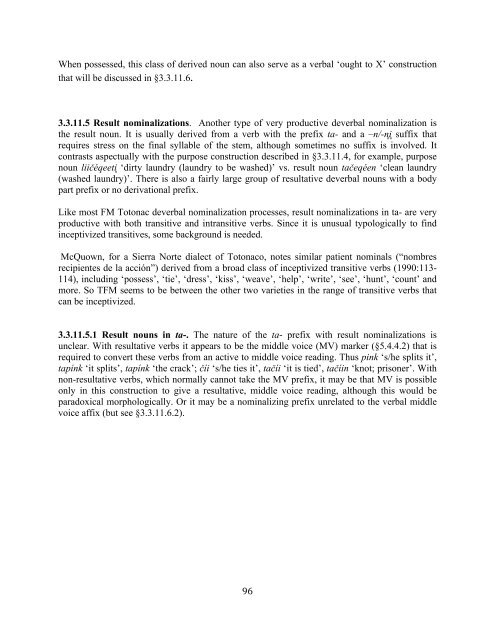The phonology and morphology of Filomeno Mata Totonac
The phonology and morphology of Filomeno Mata Totonac
The phonology and morphology of Filomeno Mata Totonac
You also want an ePaper? Increase the reach of your titles
YUMPU automatically turns print PDFs into web optimized ePapers that Google loves.
When possessed, this class <strong>of</strong> derived noun can also serve as a verbal ‘ought to X’ construction<br />
that will be discussed in §3.3.11.6.<br />
3.3.11.5 Result nominalizations. Another type <strong>of</strong> very productive deverbal nominalization is<br />
the result noun. It is usually derived from a verb with the prefix ta- <strong>and</strong> a –n/-n"i" suffix that<br />
requires stress on the final syllable <strong>of</strong> the stem, although sometimes no suffix is involved. It<br />
contrasts aspectually with the purpose construction described in §3.3.11.4, for example, purpose<br />
noun lii$éqeeti" ‘dirty laundry (laundry to be washed)’ vs. result noun ta$eqéen ‘clean laundry<br />
(washed laundry)’. <strong>The</strong>re is also a fairly large group <strong>of</strong> resultative deverbal nouns with a body<br />
part prefix or no derivational prefix.<br />
Like most FM <strong>Totonac</strong> deverbal nominalization processes, result nominalizations in ta- are very<br />
productive with both transitive <strong>and</strong> intransitive verbs. Since it is unusual typologically to find<br />
inceptivized transitives, some background is needed.<br />
McQuown, for a Sierra Norte dialect <strong>of</strong> <strong>Totonac</strong>o, notes similar patient nominals (“nombres<br />
recipientes de la acción”) derived from a broad class <strong>of</strong> inceptivized transitive verbs (1990:113-<br />
114), including ‘possess’, ‘tie’, ‘dress’, ‘kiss’, ‘weave’, ‘help’, ‘write’, ‘see’, ‘hunt’, ‘count’ <strong>and</strong><br />
more. So TFM seems to be between the other two varieties in the range <strong>of</strong> transitive verbs that<br />
can be inceptivized.<br />
3.3.11.5.1 Result nouns in ta-. <strong>The</strong> nature <strong>of</strong> the ta- prefix with result nominalizations is<br />
unclear. With resultative verbs it appears to be the middle voice (MV) marker (§5.4.4.2) that is<br />
required to convert these verbs from an active to middle voice reading. Thus pink ‘s/he splits it’,<br />
tapínk ‘it splits’, tapínk ‘the crack’; $íi ‘s/he ties it’, ta$íi ‘it is tied’, ta$íin ‘knot; prisoner’. With<br />
non-resultative verbs, which normally cannot take the MV prefix, it may be that MV is possible<br />
only in this construction to give a resultative, middle voice reading, although this would be<br />
paradoxical morphologically. Or it may be a nominalizing prefix unrelated to the verbal middle<br />
voice affix (but see §3.3.11.6.2).<br />
! -*!

















